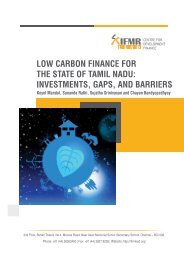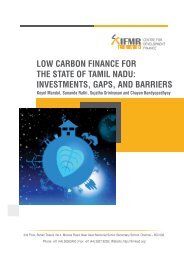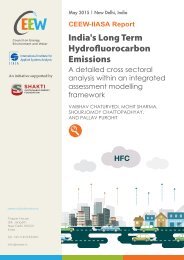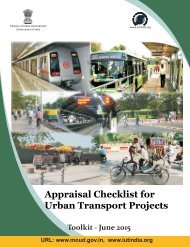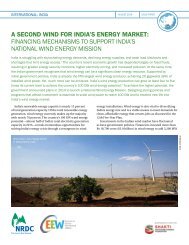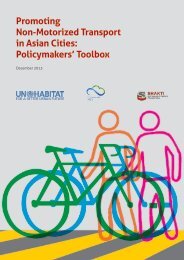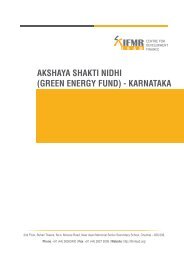Enhancing India’s Readiness to Climate Finance
India has taken several steps to improve its national response to climate change. India’s climate finance requirements, however, are very high, and will need to be met through a combination of public, private and international climate finance. See more at: http://shaktifoundation.in/
India has taken several steps to improve its national response to climate change. India’s climate finance requirements, however, are very high, and will need to be met through a combination of public, private and international climate finance. See more at: http://shaktifoundation.in/
- No tags were found...
You also want an ePaper? Increase the reach of your titles
YUMPU automatically turns print PDFs into web optimized ePapers that Google loves.
<strong>Enhancing</strong> <strong>India’s</strong> readiness <strong>to</strong> access and deliver international climate finance<br />
regions of the country. In this respect, a lack of expertise in preparing and developing new projects is<br />
a major capacity constraint which is limiting the overall absorptive capacity for climate finance in India.<br />
Lessons & Options for India<br />
Experience from Mexico shows that formally designating DFIs <strong>to</strong> be responsible for different<br />
sec<strong>to</strong>rs, themes, and activities across the national climate change response can help countries<br />
develop a pipeline of bankable projects by providing more sources and instruments for finance<br />
across a variety of sec<strong>to</strong>rs.<br />
Experience from China shows that focusing on capacity building at sub-national levels can<br />
help improve project development, design, and implementation that are the necessary first<br />
steps <strong>to</strong> developing a pipeline of bankable projects.<br />
In Mexico, DFIs have been given greater mandates <strong>to</strong> finance their national plans on climate<br />
change. The central role of DFIs in delivering the country’s national climate change strategy,<br />
has led <strong>to</strong> the development of programmes and projects across a broader range of sec<strong>to</strong>rs,<br />
themes and regions. For example, the Mexican DFI NAFIN manages a number of individual<br />
programmes, including: the Mexican Forest Fund which provides payment for environmental services;<br />
the Mexican Carbon Fund, which promotes the development and use of low-carbon-emission<br />
technologies; the Trust Fund for Electric Energy Savings which promotes efficiency; and Support<br />
Services for Agricultural Marketing which works <strong>to</strong> liberalise markets and channel financial resources<br />
directly <strong>to</strong> producers. Separately, another DFI which specialises in urban development, the National<br />
Bank of Public Works and Services (BANO BRAS), operates the Energy Transition Fund (FTE) <strong>to</strong><br />
provide municipalities and low-income households with grants <strong>to</strong> increase energy efficiency through<br />
appliance and streetlight modernisation. These DFIs provide a combination of loans, training, and<br />
technical assistance <strong>to</strong> public authorities, NGOs, and businesses <strong>to</strong> implement their programmes. As<br />
such, inves<strong>to</strong>rs in Mexico have the option of funding projects across a wider range of sec<strong>to</strong>rs and<br />
activities than in India.<br />
In China, the CDM Fund provides capacity building and training for the private sec<strong>to</strong>r, which<br />
has helped <strong>to</strong> remove market and technical barriers for project developers <strong>to</strong> design good<br />
quality projects. One of the main lessons from this experience is that government-supported<br />
readiness activities need <strong>to</strong> link capacity building and technical implementation at the early stages of<br />
the project design phase so that the project developers can submit technically viable proposals that<br />
adhere <strong>to</strong> appropriate fiduciary standards demanded by institutional inves<strong>to</strong>rs or international financial<br />
agencies. With experience in developing high-quality projects that are successfully funded, project<br />
developers can slowly begin <strong>to</strong> expand their reach and develop a pipeline of projects.<br />
Developing a pipeline of bankable projects has been challenging for most countries and is not<br />
unique <strong>to</strong> India. In fact, India has a number of well-established DFIs (e.g. SIDBI and NABARD) that<br />
already manage some projects that generate climate co-benefits. However DFIs in India are not as<br />
formally linked with the national climate change response as in Mexico, nor have they explicitly<br />
mainstreamed climate change in<strong>to</strong> their wider project portfolio. As such, they have limited capacity <strong>to</strong><br />
develop bankable projects in new sec<strong>to</strong>rs & themes beyond the traditional RE and EE sec<strong>to</strong>rs (<strong>to</strong> a<br />
lesser extent), where institutional inves<strong>to</strong>rs may see room for climate-related investments.<br />
<strong>Readiness</strong> Gap 5<br />
<strong>Climate</strong> finance delivery institutions (e.g. DFIs) have limited ability <strong>to</strong> match finance needs with a<br />
blend of climate finance sources and instruments.<br />
Many of <strong>India’s</strong> peer countries are setting up new national climate finance institutions, which have the<br />
mandate <strong>to</strong> blend funding from multiple sources and allocate the funding <strong>to</strong> climate related activities<br />
using a variety of instruments that include grants, loans, equity, green bonds, de-risking, guarantees,<br />
and other forms of investment.<br />
Ref: Ricardo-AEA/R/ED59216/Final Report<br />
42




